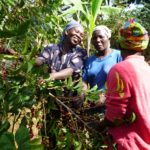If players are to reap more from the Arabica coffee value chain, there is need to enhance Private Public Partnership (PPP) dialogue, the Managing Director of Uganda Coffee Development Authority (UCDA) Dr. Emmanuel Iyamulemye, has said.
“We need to enhance dialogue between the public and private sectors, the academia and development partners to take advantage of the Ugandan Arabica Coffee value chain opportunities,” he said Tuesday in Kampala during a workshop to explore opportunities for development of Uganda’s Arabica coffee value chain.
The workshop was jointly organised by UCDA in partnership with the International Growth Centre.
According to Dr. Iyamulemye, coffee impacts on about 85% of Uganda’s population, and consequently presents a huge rural development opportunity.
Latest figures show that both the volume and value of Uganda’s exports at the international market increased. In terms of volume, Uganda contributed to the global coffee exports market in the month ending January a total of 401,930 -60kg bags.
The exports during this period, which is the fourth month on the coffee calendar, earned the country foreign exchange revenue worth US$43.66m (Shs158b) up from $42.2m (Shs153) earned the previous month.
Dr. Iyamulemye attributed the increase in coffee exports to the new crop and said that more than 500 million seedlings which were planted three-four years ago have started fruiting.
Latest UCDA report shows that coffee exported from February last year until January 2018 hit 4.77m bags worth US$549m (Shs1.9tn).There was an increase of about 2.1 percent from the 4.6m bags exported the previous year.
Robusta comprised 3.75m bags, which fetched the country US$413m (Shs1.5 trn). Arabica fetched the country US$136m (Shs459b) from 1.02m kg bags the country exported.
Estimates for February are tagged at 350,000 60-kg-bags as the main harvesting season in Central region ends.
Government last year launched the Coffee Roadmap, targeting to export 20m bags of coffee per year of by 2025.
On April 13, 2017 President Yoweri Kaguta Museveni launched the Coffee Roadmap, and ordered the coffee stakeholders to ensure that Uganda achieves its coffee production target 20 million bags annually by 2025.
Subsequently, government through the Coffee Lab, identified nine key transformative initiatives that focus on putting Uganda on the path to achieving the target. They hinge on three pillars which will catalyse the transformation of the coffee sector in Uganda namely; Demand and Value Addition, Production and Enablers. These are further broken down into specific initiatives:
- Building structured demand through country to country deals, especially with China.
- Branding Ugandan coffee to drive demand and improve value by up to 15%.
- Supporting local coffee businesses for value addition, including primary processing and a soluble coffee plant.
- Strengthening farmer organisations and producer cooperatives to enhance commercialisation for smallholder farmers and ensuring broad access to extension, inputs, finance and aggregation.
- Support joint ventures between middle-class owners of underutilised land and investors to develop coffee production
- Providing and promoting concessions for coffee production on large underutilised tracts of land.
- Improving the quality of planting material (seeds and seedlings) through strengthened research and multiplication of improved varieties
- Improving access to quality inputs by reducing counterfeiting (fertiliser, pesticides, herbicides) from current 40-60%.
- Developing a coffee finance programme with the Central Bank and Treasury to provide financing to farmer organisations (including on-lending) to smallholders, coffee businesses and investors.








